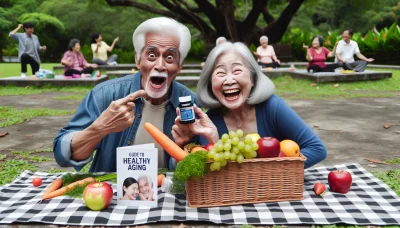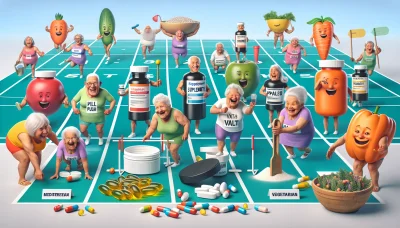Center for healthy aging Quiz
Test Your Knowledge
Question of
Understanding Healthy Aging
Defining Healthy Aging
Healthy aging is not just the absence of disease, but the maintenance of physical, mental, and social well-being throughout one's life. It's a holistic approach that emphasizes the quality of life as much as its duration. With a greater number of people living longer lives, understanding what constitutes healthy aging has become increasingly important.
Biological Aspects of Aging involve changes in cellular processes over time. This includes reduced cell division, DNA repair, and immune response. However, with a balanced diet, regular exercise, and preventative healthcare, many biological declines can be mitigated or delayed.
Psychological Components of Longevity are equally crucial. Mental health plays a pivotal role in healthy aging. Activities that stimulate the mind, such as learning new skills or engaging in hobbies, contribute to cognitive preservation and emotional satisfaction.
Social Factors Influencing Elderly Well-being include maintaining relationships and community involvement. Social engagement has been linked to improved mental health and a lower risk of mortality. It's clear that a supportive social network is a key ingredient for aging gracefully.
The Role of Genetics in Aging
Hereditary Patterns and Longevity have shown that genetics can influence the aging process. While genetics set certain parameters, lifestyle choices can often interact with one's genetic makeup to influence overall health outcomes.
Gene Therapy and Age-Related Research are exciting frontiers in the science of aging. Advances in these areas offer potential for interventions that could modify the way our bodies age, addressing age-related diseases at their genetic roots.
The Impact of Family Health History on individual aging trajectories cannot be overstated. Understanding one's family health history helps in predicting potential health issues and taking proactive steps towards prevention and early detection.
Common Myths About Aging
Debunking Age-Related Stereotypes is essential to foster a society where older adults are respected for their experience and wisdom. The myth that aging inevitably leads to cognitive decline is being challenged by evidence that shows many maintain mental sharpness well into old age.
- Mistake: Assuming all older adults are technologically inept can lead to exclusion from digital advancements.
- Mistake: Believing physical decline is unavoidable prevents people from pursuing activities that could improve their health span.
- Mistake: The stereotype that seniors cannot adapt to change overlooks their lifetime of adapting to societal transformations.
- Mistake: Treating retirement as an end rather than a new chapter may limit opportunities for growth and fulfillment.
- Mistake: Thinking that loneliness is an inevitable part of aging ignores the importance of fostering social connections at any age.
Sepa
Nutrition and Aging
Essential Nutrients for the Elderly
As we age, our bodies undergo significant changes that affect nutritional needs. Seniors require a balanced intake of nutrients to maintain health and vitality. It's paramount to focus on nutrient-dense foods that provide the vitamins and minerals necessary to support an aging body.
Vitamins and Minerals for Bone Health: Calcium and vitamin D are the superheroes when it comes to maintaining bone health for the elderly. A diet rich in these nutrients, alongside magnesium and vitamin K, can help reduce the risk of osteoporosis and fractures. Dairy products, leafy greens, and fortified foods are essential inclusions.
Importance of Hydration in Elderly Diets: Hydration is crucial! With age, the sensation of thirst may diminish, increasing the risk of dehydration. Elderly individuals should consciously consume fluids throughout the day, even if they do not feel thirsty. Soups, fruits, and herbal teas are excellent for staying hydrated.
Protein Needs for Muscle Maintenance: Protein is vital for preserving muscle mass and strength. As metabolism slows down with age, it's important to include lean proteins like poultry, fish, beans, and legumes in the diet to support muscle repair and energy levels.
Dietary Adjustments with Age
The metabolic rate declines as we get older, necessitating adjustments in caloric intake. Consuming nutrient-rich foods that are lower in calories can help manage weight without sacrificing nutrition. It's a balancing act that requires careful consideration of food choices.
Managing Caloric Intake as Metabolism Slows: As metabolism decreases with age, seniors need fewer calories. However, nutrient requirements remain high. Opting for whole grains, lean proteins, and a variety of fruits and vegetables can meet these needs without excess calorie intake.
Adapting to Changes in Digestive Health: Digestive efficiency often decreases with age due to changes in gastrointestinal function. To combat this, seniors should incorporate fiber-rich foods into their diets to promote digestive health and prevent constipation.
- Increase intake of water and fiber-rich foods like whole grains and vegetables.
- Avoid excessive consumption of high-fat foods which can slow digestion.
- Consider probiotic foods or supplements to support gut health.
- Eat smaller, more frequent meals to ease digestive processes.
Superfoods for Longevity
The term "superfood" refers to foods packed with nutrients that offer health benefits beyond basic nutrition. These powerhouses support overall well-being and can contribute significantly to longevity when incorporated into an elderly individual's diet.
Antioxidant-Rich Foods for Cellular Health: Foods loaded with antioxidants fight against oxidative stress which accelerates aging. Berries, dark chocolate, nuts, and green tea are just a few examples that can help protect cells from damage.
Omega-3 Fatty Acids and Brain Function: Omega-3 fatty acids are essential for maintaining brain health. Fatty fish like salmon is an excellent source of omega-3s which have been linked to reduced rates of cognitive decline in seniors.
Fiber-Rich Foods for Digestive Wellness: Fiber is not just good for digestion; it also helps regulate blood sugar levels and can reduce the risk of heart disease. Legumes, whole grains, fruits, and vegetables should be staples in the diet for optimal digestive wellness.
Diet Plans Promoting Longevity
Mediterranean Diet and Its Benefits
Dive into the heart of the Mediterranean diet and discover a world brimming with tantalizing flavors that not only delight your taste buds but also fortify your health! This diet stands as a pillar of longevity, emphasizing fruits, vegetables, nuts, whole grains, and olive oil, while limiting red meat and processed foods. It's more than just food; it's an invitation to a lifestyle that celebrates fresh, seasonal eating and communal meals.
Heart Health and the Mediterranean Lifestyle : Imagine saturating your body with the goodness of omega-3s from fish and heart-healthy fats from olives! The Mediterranean diet is a powerful ally against cardiovascular diseases. It's like a symphony of nutrients working in harmony to keep your heart rhythmically beating with vigor and vitality!
Cognitive Benefits of Mediterranean Eating Habits : Not only does this diet care for your heart, but it also cradles your brain health. Studies illuminate the cognitive benefits tied to this dietary pattern think sharper memory, alertness like the morning sun, and a reduced risk of neurodegenerative diseases. It's a nourishing embrace for your brain's well-being!
Incorporating Mediterranean Foods into Your Diet : Transitioning to this diet isn't just easy; it's an adventure in flavor! Start by drizzling olive oil on salads, snacking on nuts instead of chips, and choosing fish twice a week. Each step is a stride towards longevity every meal becomes a toast to life!
Plant-Based Diets for Healthy Aging
A plant-based odyssey awaits you one where vibrant veggies take center stage and fruits serenade your senses! By embracing a diet rich in plant-derived foods, you're opting for an abundance of antioxidants, fiber, vitamins, and minerals. This is nature's elixir for aging gracefully; its like infusing each day with life-affirming energy.
Nutritional Advantages of Plant-Based Eating : Every bite is packed with potential potential to combat chronic illness, energize your cells, and support sustainable weight management. It's not just about subtracting animal products; it's about adding variety, color, and zest to your plate!
- Balancing Macronutrients in a Vegan Diet : Keep an eye on protein sources think beans, lentils, tofu and ensure you're getting enough healthy fats from avocados and nuts. Carbohydrates should come from whole grains rather than refined sugars.
- Overcoming Deficiencies with Plant-Based Choices : Vitamin B12, iron, calcium these can be elusive in plant-based realms. Fortified foods or supplements can be life-savers here. Don't forget about vitamin D from sunlight or fortified non-dairy milk.
Anti-Inflammatory Diets and Aging
Inflammation is like a silent alarm that can sometimes go awry within our bodies. An anti-inflammatory diet acts as a gentle whisper calming this alarm featuring foods rich in antioxidants while shunning those that fan the flames of inflammation. It's about choosing foods that heal rather than harm.
Foods that Fight Inflammation : Imagine arming yourself with colorful berries, leafy greens, fatty fish like salmon, nuts full of healthy fats these are your warriors against inflammation. Turmeric adds not only exotic color but also medicinal properties to this fight.
Chronic Diseases and Inflammatory Foods : By bidding farewell to processed meats, trans fats found in margarine or fried foods, refined carbs you're essentially closing the door on chronic diseases' attempts to take root in your body.
Meal planning for an anti-inflammatory diet doesn't have to be daunting its an opportunity to get creative! Infuse dishes with herbs like ginger or garlic; select whole grains over white bread; choose dark chocolate over sugary treats. Each meal becomes an act of self-care!
Physical Activity and Healthy Aging
The Importance of Exercise for Seniors
Engaging in regular physical activity is a cornerstone of healthy aging. As we grow older, exercise becomes crucial in maintaining not just our physical strength but also cognitive function and emotional well-being. It's a powerful tool that can help manage weight, reduce the risk of chronic diseases, and improve overall quality of life.
Maintaining an active lifestyle as a senior can significantly enhance mobility and independence. Exercise boosts energy levels, supports heart health, and helps keep the muscles strong. It's never too late to start; even moderate activity can make a profound difference in seniors' health outcomes.
Cardiovascular Health and Regular Activity
Regular cardiovascular activity is vital for seniors to maintain heart health and endurance. Activities like brisk walking, swimming, or cycling can greatly improve cardiovascular function and reduce the risk of heart disease. Even low-intensity exercises, when done consistently, can yield significant benefits for heart health.
Consistent physical activity helps regulate blood pressure and cholesterol levels in older adults. Engaging in exercises that raise the heart rate has been shown to improve circulation and lung capacity as well, making everyday tasks easier and more enjoyable.
Strength Training Benefits for Older Adults
Strength training is incredibly beneficial for seniors, helping to preserve muscle mass and bone density. Incorporating resistance exercises such as lifting weights or using resistance bands can combat age-related muscle loss and osteoporosis. Moreover, it aids in maintaining metabolic rate which is essential for weight management.
Stronger muscles lead to better posture, balance, and overall stability which are crucial factors in preventing falls among the elderly population. Strength training doesn't always require heavy weights; body-weight exercises are also effective in building muscle strength safely.
Flexibility and Balance Exercises for Fall Prevention
Improving flexibility through stretching routines can greatly enhance seniors' quality of life by easing joint pain and increasing range of motion. Yoga or Tai Chi are excellent options that combine both flexibility enhancement with balance training.
Fall prevention is a critical aspect of senior fitness programs. Balance exercises such as standing on one foot or walking heel-to-toe provide stability training that helps prevent falls. These activities not only improve physical coordination but also contribute to mental sharpness.
Overcoming Barriers to Physical Activity
- Dealing with Mobility Issues: For seniors facing mobility challenges, it's important to choose low-impact exercises that do not strain joints. Water aerobics or chair yoga can be excellent alternatives that provide the benefits of exercise while accommodating limited mobility.
- Finding Motivation and Support: Staying motivated can be difficult at any age. Seniors should seek out social support through exercise groups or community classes that offer camaraderie along with fitness guidance.
- Safe Exercise Tips for Chronic Conditions: Always consult with healthcare providers before starting an exercise routine, especially if managing chronic conditions. Tailored workouts that account for specific health issues are essential for safe practice.
Exercise Programs for the Elderly
Low-Impact Workouts for Joint Health
Elderly individuals often need to pay special attention to joint health when engaging in exercise routines. Low-impact workouts like swimming or cycling can provide cardiovascular benefits without putting undue stress on joints.
Pilates is another great option that focuses on core strength while promoting flexibility and joint health. Such exercises ensure that seniors can stay active without exacerbating conditions like arthritis or risking injury from high-impact activities.
Group Fitness Classes for Social Engagement
Beyond physical benefits, group fitness classes offer social interaction which is key in keeping spirits high as we age. From dance classes to group walks, these activities encourage social bonds while promoting physical wellness.
Social engagement through fitness creates accountability among participants, often leading to higher adherence rates compared to solitary exercising regimes. It also provides an opportunity for seniors to share experiences and support each others fitness journeys.
Tailored Exercise Plans for Individual Needs
No one-size-fits-all approach exists when it comes to senior fitness; therefore, personalized exercise plans are paramount. A tailored plan considers individual capabilities, preferences, medical history, and goals ensuring maximum benefit from the effort invested in physical activity.
A professional fitness trainer specialized in senior fitness can design a program that addresses specific needs while minimizing risks. Regular assessments help adapt the program over time as abilities change ensuring continuous progression towards healthier aging.
Mental Well-being and Aging Gracefully
Cognitive Health in the Elderly
As we age, cognitive health becomes paramount to living a vibrant life. Engaging the brain through various exercises can significantly enhance mental agility and delay cognitive decline. Its not just about crossword puzzles; even learning a new language or instrument can be incredibly beneficial.
Nutrition also plays a critical role in maintaining cognitive functioning. Diets rich in omega-3 fatty acids, antioxidants, and vitamins are associated with lower risk of dementia. Incorporating foods like walnuts, blueberries, and leafy greens into daily meals can support brain health immensely.
Stress is a silent enemy of cognitive preservation. Chronic stress leads to memory loss and diminishes the brain's ability to recover from injury. Effective stress management techniques such as deep breathing exercises, yoga, and regular physical activity can protect the aging brain.
Emotional Health and Social Connections
The sting of loneliness can be particularly sharp for the elderly. It's not just about feeling isolated; it has tangible effects on mental health. Studies show that loneliness can be as harmful as smoking or obesity in terms of its health impact.
Maintaining social networks isn't just enjoyableit's essential for emotional well-being. Regular interaction with friends, family, and community groups keeps spirits high and minds sharp. Whether its joining a book club or attending local events, staying socially active is key.
- Encourage regular contact with family and friends.
- Participate in group activities that align with personal interests.
- Consider volunteer work to foster a sense of purpose and community connection.
- Leverage technology to stay connected with loved ones far away.
- Explore local senior centers for socializing opportunities.
Mindfulness and Meditation Practices
Mindfulness isn't just a buzzword; it's a powerful tool for enhancing emotional well-being. By fostering an awareness of the present moment, mindfulness can reduce symptoms of depression and anxiety in the elderly. It teaches us to respond to our experiences with grace rather than react out of habit.
Meditation isn't one-size-fits-all; there are many techniques tailored to stress reduction and relaxation. Techniques like guided imagery or progressive muscle relaxation can be particularly effective for seniors looking to find inner peace and combat stress.
Incorporating mindfulness into daily routines doesn't require drastic changesits about small moments of awareness. Simple practices like mindful eating or taking walks with attention to surroundings can integrate mindfulness seamlessly into everyday life, promoting serenity and balance.
Preventative Health Measures for Seniors
Regular Health Screenings and Check-ups
The cornerstone of maintaining health as we age is the commitment to regular health screenings and check-ups. These visits can catch potential health issues early when they're most treatable. Seniors should embrace a proactive approach, scheduling appointments even when they feel healthy.
Importance of Annual Physical Exams : An annual physical exam is a must for seniors. It's a golden opportunity for doctors to assess health changes, update vaccinations, and discuss preventive strategies tailored to individual needs. Don't wait for symptomsannual exams are your wellness safeguard!
Recommended Screenings for Common Age-Related Conditions : Screenings such as mammograms, colonoscopies, and bone density tests can detect conditions like cancer or osteoporosis early on. Your healthcare provider can recommend which screenings are right for you based on your personal health history.
Staying Proactive with Preventative Care : Establishing a relationship with healthcare professionals allows seniors to stay ahead of health issues. This includes regular vision and hearing tests, dental check-ups, and mental health evaluationsall crucial components of comprehensive senior care.
Vaccinations and Immune System Support
Vaccinations are a powerful tool in the prevention arsenal for seniors. They reduce the risk of contracting serious diseases, some of which can be life-threatening in older adults. It's imperative to stay up-to-date with recommended immunizations.
Essential Vaccines for Older Adults : Influenza, pneumococcal pneumonia, shingles, and tetanus vaccines are particularly important for seniors. Consult with your doctor about these vaccines and any additional ones you may need based on your health status and lifestyle.
- Boosting Immunity Through Nutrition : A balanced diet rich in vitamins and minerals supports a robust immune system. Include plenty of fruits, vegetables, lean proteins, and whole grains to help fend off illnesses.
- Understanding the Aging Immune System : Recognize that your immune system changes with age. Engage in regular exercise, get sufficient sleep, and manage stressall vital practices that contribute to immune strength.
Managing Chronic Conditions
Living with chronic conditions requires vigilance and an active management plan. Regular consultations with healthcare providers ensure that these conditions do not progress unnecessarily.
Strategies for Controlling Hypertension : Keep blood pressure in check by reducing salt intake, engaging in daily physical activity, managing stress levels, and adhering strictly to prescribed medications. Monitoring blood pressure at home can also provide valuable feedback on your condition.
Diabetes Management in Later Life : Seniors with diabetes should focus on controlling their blood sugar levels through a combination of diet, exercise, medication adherence, and regular monitoring. Personalized care plans developed with healthcare providers are essential.
Coping with Arthritis and Maintaining Mobility : To maintain mobility while living with arthritis, incorporate low-impact exercises such as swimming or cycling into your routine. Additionally, pain management techniques and ergonomic aids can greatly enhance quality of life.
Community Resources for Healthy Aging
Senior Centers and Their Offerings
Senior Centers are a goldmine for resources that cater to the needs of the aging population! They provide an incredible array of programs designed to keep seniors active, informed, and socially connected. From health screenings to financial planning seminars, these centers are the go-to places for empowering seniors towards a fulfilling lifestyle.
Educational Workshops and Classes are regularly offered to help seniors stay mentally sharp and informed. Topics range from computer literacy to retirement planning, ensuring that there's always something new to learn. These workshops are pivotal in helping seniors navigate the evolving world around them with confidence!
Fitness Programs Tailored to Seniors focus on maintaining mobility, strength, and flexibility. Classes like yoga, tai chi, and water aerobics are popular choices that combine fun with fitness. These programs are not just about physical health; they also provide social opportunities that are essential for emotional well-being.
Moreover, Senior Centers understand the importance of camaraderie; thus, they organize Social Events and Community Building activities. From holiday parties to day trips, these gatherings foster a sense of belonging and provide a platform for forming new friendships.
Accessing Healthcare Services
Navigating the healthcare system can be daunting, especially for seniors who face unique challenges. It's crucial to understand how to access and maximize healthcare services effectively. This includes decoding the complexities of Medicare and Insurance Plans , which is often the first step toward receiving adequate care.
Finding healthcare providers who specialize in aging is another critical aspect of senior care. It's essential to seek out Specialized Geriatric Care Providers who understand the intricacies of senior health issues and can offer personalized care plans tailored to individual needs.
The rise of technology has also introduced Telemedicine as a Convenient Access point for healthcare. This allows seniors to consult with healthcare professionals from the comfort of their own homes, making medical advice more accessible than ever before.
Support Services for Independent Living
The desire to live independently is strong among seniors, but sometimes a little help is needed. Thankfully, there are various forms of In-Home Assistance Options , ranging from personal care services to housekeeping assistance, enabling seniors to maintain their independence while receiving the support they need.
- Transportation Services for the Elderly: Many communities offer dedicated transportation options for seniors. These services ensure that mobility limitations do not hinder access to medical appointments, shopping centers, or social events.
- Meal Delivery Programs and Nutritional Support: Proper nutrition is vital for healthy aging. Meal delivery services cater specifically to dietary needs of seniors, providing nutritious meals that also minimize the effort required for meal preparation.
- Tips for Maximizing Independent Living Support: - Familiarize yourself with local community offerings. - Take advantage of transportation services provided. - Enroll in meal delivery programs that cater to your dietary needs. - Regularly assess in-home assistance needs and adjust services accordingly. - Stay informed about technological solutions that can aid independence. - Engage with support groups or networks within the community. - Always have emergency contact information easily accessible. - Consider wearable devices that can alert others in case of a fall or medical issue.












